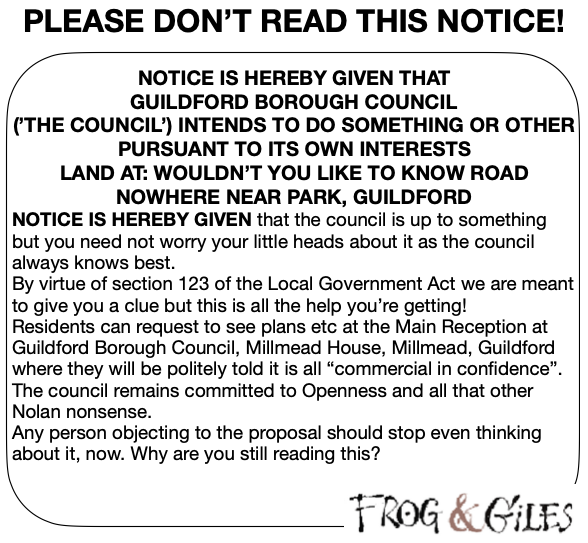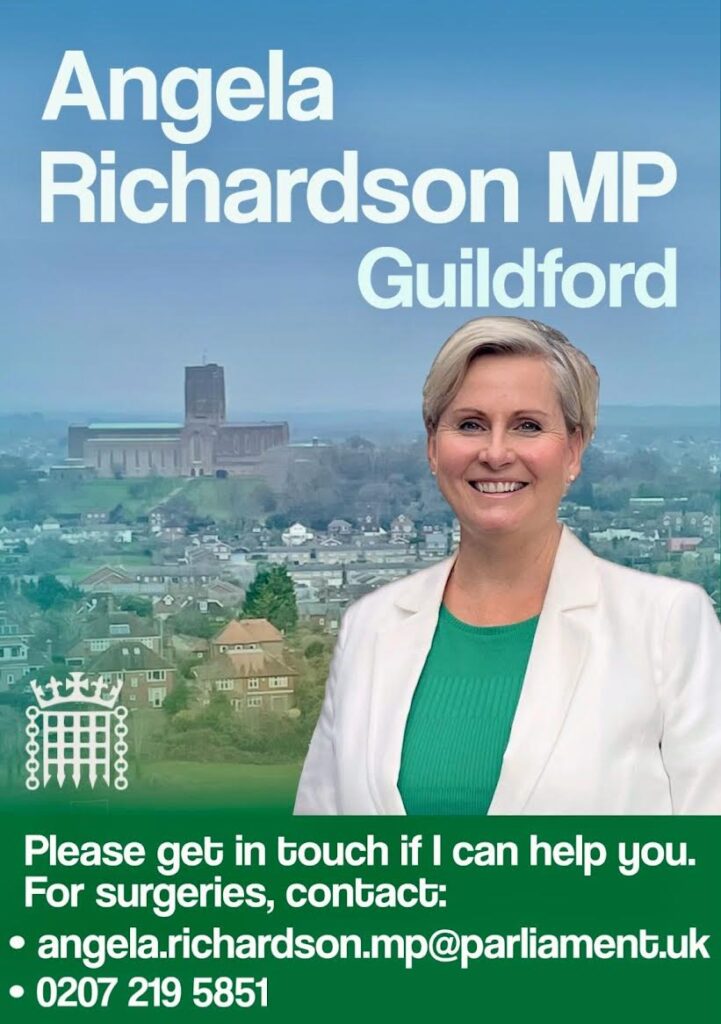 Abraham Lincoln
If given the truth, the people can be depended upon to meet any national crisis...
Abraham Lincoln
If given the truth, the people can be depended upon to meet any national crisis...
 Guildford news...
for Guildford people, brought to you by Guildford reporters - Guildford's own news service
Guildford news...
for Guildford people, brought to you by Guildford reporters - Guildford's own news service
Letter: What Gives Us The Right To Say No To Growth?
Published on: 28 Aug, 2016
Updated on: 28 Aug, 2016
In response to: There Is A Connection Between Housing Supply, Demand and Prices
Finally some sense and admittance that the real reason that many members of the population of our fine town are up in arms around development on the edge on the green belt is because it doesn’t suit their comfortable existences.
I was fortunate enough to interview Dame Kate Barker earlier this year. She seemed to hold the view that we were not yet in a housing crisis, because so many of us are so well off we’ve not been touched by it.
It’s a nonsense to suggest building thousands of new homes won’t have a positive impact on housing affordability in the borough. People seem to forget about the housing ladder that has many families, such as my own, living in dense accommodation in the town centre when we would really love to move out to one of these urban edge locations and experience such luxuries as a garden or on plot parking.
There are many streets of terraces like ours full of families who would happily free up smaller urban living or see this divided up into flats but there’s nowhere for us to move to.
GBC have not proposed to build in the Areas of Outstanding Natural Beauty, but the Local Plan is exactly the vehicle to review the green belt.
Humanity is an expanding race, and surely even the most steadfast objectors realise Guildford, like every other settlement in the UK has grown outwardly over hundreds of years.
What gives people the right to declare as I read in one post, “…we have had enough”? Goodness, even the City of London had a historic “green belt” equivalent under Elizabeth I, with a three mile no build cordon around The City – which is now the global financial district.
Why are fellow citizens so keen to cut off their noses to spite their faces? Both Alderman Bridger and Keith Chesterton are right. We must consider the future sustainability of our town.
If today we cannot find suitable accommodation on decent incomes, how much harder will it be for our children.
I for one hope we don’t have to wait to find out.
Responses to Letter: What Gives Us The Right To Say No To Growth?
Leave a Comment Cancel replyPlease see our comments policy. All comments are moderated and may take time to appear.

See Dragon story: GBC’s Explanation of Major Land Sale Notice Error ‘Borders on Arrogant’ Says Councillor




Recent Articles
- Surrey Children’s Services Improvement Recognised by Ofsted
- Independent Guildford Stationers Are ‘Top of the Shops’
- Birdwatcher’s Diary No.304
- Cyclist Dies in Peaslake
- Surviving Strategic Director Quits to Take Up CEO Role with a West Sussex Council
- Letter: Damning Reports Should Not Be Used to Gain Political Advantage
- New Leader of the Opposition at Waverley
- Surrey Day’s Celebrations Took to the Skies
- Notice: Dance with Junction 9 to Raise Money for Charities
- Mistreated Former Sub-postmasters Receive Standing Ovation


Recent Comments
- Olly Azad on Mistreated Former Sub-postmasters Receive Standing Ovation
- Barry Jutsum on Letters, Comments, Complaints Policy and Privacy Statement
- Aubrey Leahy on Guildford Police Station to Close – Officers to Move to Mount Browne HQ
- John Ferns on Guildford Police Station to Close – Officers to Move to Mount Browne HQ
- Barry C Williams on Letter: Cross-party Effort Required to Improve Police Resourcing in Surrey
- Anthony Mallard on Guildford Police Station to Close – Officers to Move to Mount Browne HQ
Search in Site
Media Gallery
Dragon Interview: Local Artist Leaves Her Mark At One of England’s Most Historic Buildings
January 21, 2023 / No Comment / Read MoreDragon Interview: Lib Dem Planning Chair: ‘Current Policy Doesn’t Work for Local People’
January 19, 2023 / No Comment / Read MoreA3 Tunnel in Guildford ‘Necessary’ for New Homes, Says Guildford’s MP
January 10, 2023 / No Comment / Read More‘Madness’ for London Road Scheme to Go Ahead Against ‘Huge Opposition’, Says SCC Leader
January 6, 2023 / No Comment / Read MoreCouncillor’s Son Starts Campaign for More Consultation on North Street Plan
December 30, 2022 / No Comment / Read MoreCounty Council Climbs Down Over London Road Works – Further ‘Engagement’ Period Announced
December 14, 2022 / No Comment / Read MoreDragon Interview: GBC Reaction to the Government’s Expected Decision to Relax Housing Targets
December 7, 2022 / No Comment / Read MoreHow Can Our Town Centre Businesses Recover? Watch the Shop Front Debate
May 18, 2020 / No Comment / Read More







Mark Rostron
August 29, 2016 at 4:41 am
James Gross’s assertion that “Humanity is an expanding race…” encapsulates the misunderstanding at the root of the problem.
Humanity cannot expand at an unsustainable level. Malthus was correct in saying: “That the increase of population is necessarily limited by the means of subsistence.”
At some point politicians will have to limit population growth the alternative being the intervention of natural or other forces. The only question is when any of those events will take place.
John Perkins
August 29, 2016 at 12:59 pm
The land area of Guildford borough is finite. Even if it could be expanded, the land area of the country is finite and so too is the world beyond that. The air above is finite, as is the ground below.
Sustainability is a much abused word. By definition it’s not sustainable to consume something that cannot be replaced.
What happens when the expansion of the human race causes any resource to be exhausted?
I, for one, hope they never find out.
Jules Cranwell
August 29, 2016 at 2:54 pm
Dame Kate Barker is correct. There is no housing crisis in the UK. What we have is a demand crisis in the South East due to decades of under investment in other parts of the UK.
Houses are available in Liverpool for as little as 100 pounds!
We cannot meet more housing demand in the South East, due to overstretched infrastructure and no plans for improvements or investment.
Crisis, what crisis? It is a myth perpetrated by the development lobby, to swell their already monstrous profits.
David Smith
August 30, 2016 at 12:44 pm
I would like to thank James Gross for saying what the majority of people in the town are thinking.
Ben Paton
August 30, 2016 at 5:40 pm
According to the contributor growth is necessary for sustainability. The implication is the more growth the better. Nowhere are any constraints mentioned.
World population has grown from around two billion around the First World War to over seven billion today.
Unfortunately, the past is not always a reliable guide to the future. The twentieth century is an aberration in human history – not a representative sample of what is possible. The norm is for living standards to remain, on average, static – not to grow indefinitely.
The reality is that resources are not limitless. Population growth without commensurate productivity growth results in increasing poverty – as the history of Africa since 1945 proves. The increase in world population in the twentieth century of 350%, while maintaining or increasing living standards, has only been possible because of massive increases in per capita consumption of hydrocarbons over that time period.
Perhaps those who share pro-development opinions believe that a further 350% growth in world population is sustainable. Perhaps they believe that another trillion barrels of crude oil will be found in the next fifty years. Fortunately, the women of our species when they have the freedom to control their own fertility look at things differently.
To address some of the questions and statements in this letter:
1) To question the rights of citizens to state their preference for lower growth is to deny localism and local accountability. It is to deny people’s right to self determination. Why should central government impose “growth targets” on local people if it is not sustainable and if it undermines their living standards?
2) It is wrong to generalise that electing to build fewer houses in the green belt is denying people the right to buy a house. If everyone has two children – which on average is roughly the case – and if they each inherit half a house then the average child with a partner will in the fullness of time be able to afford to buy a house.
Not even Dame Barker believes that building houses would make a material difference to housing affordability. House prices correlate better in the long run with the growth of bank lending and the size of the central bank balance sheet.
Philip Gibbs
September 1, 2016 at 12:33 pm
A quick Google search reveals that a James Gross of Guildford works in the planning sector. I wonder if this is the author?
Only people with such business interests seem to think this way. The rest of can see that the green belt was designated to stop urban sprawl. Planners knew that one day developers would want to build everywhere so they set a limit at the green belt. The time has now come for that principle to fulfill its role.
No, building more houses is not reducing house prices. The only thing that can do that is Brexit, as acknowledged by the former chancellor when he tried to use it to scare home owners into voting to remain. If we can control immigration then we do not need to build on the green belt. Developers should build on their land-banked brownfield sites and leave the green belt for future generations.
We asked James Gross, author of the letter, to confirm his occupation but have not received a reply. Ed